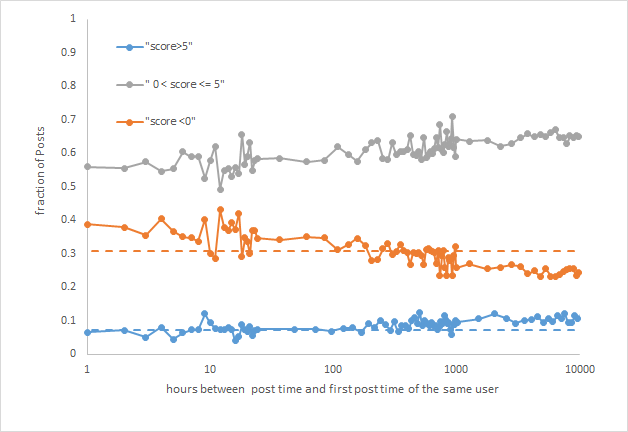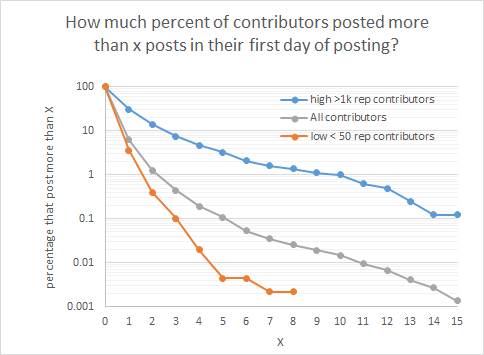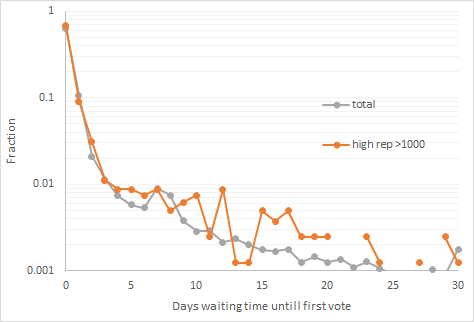My problem with this is that the trust levels are meant to show experience an all topics, enough so that they don’t know what to do with their new permissions.
I agree that this may be too restrictive.
Indeed, there will be a higher number of low level posts when we allow new posters to post many posts within 1 day. See the following statistic (for stats.SE) which looks at the number of posts that have been posted within a certain time of the first post of the same user, and describes the fraction of posts with high and with low score.
Among the first posts (31% of the total posts is a first post) 30% is a low quality (score <0) post and 7% is a high quality (score >5) post.
Among the posts that were posted within the first 24 hours after the first post of the same user (2.7% of the total posts is like that) a slightly higher percentage 37% is low quality and 7% is a high quality.

However. When we look at the high reputation contributors then we see that they often made many posts in the day that they made their first post. Most users (94%) only post 1 time in their first day of their posting. However among the users with >1k rep this is much less (69%) and 31% of the high rep users made multiple posts in their first day of posting.

I have been counting answers+questions together in these statistics but the idea remains that bulk posting in the first day is something desirable for beginning contributors that will later turn out to be high rep. Limiting this value is doing harm while it does not really filter out many low rep posts. If the reason is to limit potential spam then this limit might be applied incidentally on spammers specifically rather than every newbie.
Ah, but that’s where the “May now post n questions/answers per day, where n is the number of well-received questions/answers they have + 1” comes in:
For every well-received (positive score) question/answer they have, they may ask another one.
Perhaps the starting limit could be 3 questions/answers in order to get more chance of gaining a well-received question/answer.
Or maybe make this ‘posts per day’ limit something that only happens in case of a negative score, and not the starting point.
It is not very welcoming if a new collaborator has to wait for reputation before they can start collaborating.
Sure, it may prevent spam or newbies placing a lot of bad stuff, but the first score point, although it seems easy, might take some time (more than a third of the users do not receive an upvote on their first day). We do not want to have some experts, even when it is an almost negligible handful, to feel potentially unwelcome in this way.

https://data.stackexchange.com/stats/query/1167272/distribution-of-time-untill-first-vote
(note the precision is not very high because votes are recorded by day and not by time - so a post that is placed in the evening may obtain an upvote very quickly but be counted as 1 day required for upvote - but the story is more or less clear)
Hugely agree. I didn’t think of that, but that’s FAR better.
On a different note, I’d like to replace hours spent on site to unique days visited, so that we can ensure the person isn’t just showing up once and gaining trust to be unused later.
Rate limiting on questions and answers needs to be handled differently. The difference in the likelihood of bad posts occurring, their damage to the site, and the motivation of the posters is very different between the two.
Questioners come to the site asking for a favor. It makes sense to limit that until they can show they are not abusing the privilege. On the other hand, answerers are volunteering their time to create content. They should be given the benefit of the doubt until there is enough history to judge them either way.
Also think how this will be perceived by each group. You come here and ask a 1000 people for a favor. It really should be understandable if we say “Wait, hold on a bit. You’ve already asked for one favor. Until we have a chance to judge how well you did that, we’re going to limit you to only 1 favor a day.”.
As an answerer, you come here to help. Yes, of course you have your own personal motivations for doing that, but overall you come here to do a favor. Rate limiting that without evidence of bad behavior says “We’re only going to let you volunteer your free time to add content here once a day until we can be sure that it’s content we actually want.”. That’s rather a slap in the face. I’d probably think to myself “screw these assholes” and be gone.
I am not saying that the rate limits should not be handled differently. I am just saying that I used a combined statistic for those graphs.
Newest suggestions - more feedback, please.
Trust Level 0 - Newbie
This is the level of trust for brand new users. Contains a "new contributor" label.- May post 3 questions and 3 answers per day.
- May comment infinitely on their own questions/answers.
Trust Level 1 - Novice
A level of trust for new members.Requirements:
- No questions/answers with a negative score 1 hour after asking at least 1 question.
New Perks:
- Question/answer/comment count restrictions are removed.
- May now suggest edits and flag posts.
- May now post up to 10 comments per day on other people’s questions/answers.
Beyond Trust Level 1, Trust should become site-specific. This means any numbers in bold may be customized by the site’s moderators.
Again, questions != answers.
Perhaps your mechanisms are fine, but there must be separate tweak parameters for questions and answers, with the default numbers different.
I like this better, sometimes people have followup questions, and it would really stink to make them wait a full 24 hours before they get to ask them. Better to strike while the iron is hot.
I’d be willing raise the answer limit to 10, but we’ve got to combat spam somehow.
Some couple of cents:
- I would change the name newbie into something less negative (ans possibly also the name novice, which doesn’t sound so great either). Potentially use no names and only numbers, in order to avoid potential unwanted associations. (and possibly use ‘names’ only for the higher levels e.g. moderator, administrator and council).
- I would make level 1 the standard where somebody starts (like on SE you start with 100 points) if you come from another place. It is simpler. (the time period may be confusing)
Yes, TL0 and TL1 apply across all sites, but TL2+ do not.
How often does such spamming occur? In addition, for this purpose we could make some spam-detecting algorithm that finds this out rather than having a (unwelcoming) limit up-front which will work standard for everybody.
I’d be fine with applying rate limiting when your average (possibly weighting recent activity more) rating is negative. Spam would hopefully be downvoted quickly with little controversy. In fact, it should also be flagged, for yet another way to deal with spam and the user that created it.
I don’t think it’s negative, just factual. I personally would have no objection to be labeled “newbie” until some minimum activity/rating/time threshold is met. There is no shame in being new to a site.
What about not having limits of X per day, but instead forcing a rate-limit of ca. 1 hour between each question and 15 mins between each answer (instance-wide). Also comments shouldn’t be infinitely, but only rate-limited (e.g. once every 60 seconds).
Instead of Newbie we might choose “New User” if you think it is too negative @MartijnWeterings.
The requirements shouldn’t be based on questions only, but base on all types of posts. We shouldn’t remove QAC restrictions at all, only have “friendlier” rate limits (e.g. Q: 20 mins, A: 5 mins, C: 20 secs). Voting should also be given only to TL1+ members. Comment limits per day should not exist IMO. Having reasonable rate limits should be enough.
What about these trust level names:
- New User
- New Members
- Members
- Senior Members
- Leaders
- Moderators
- Administrators (or not integrated in TL system)
There is indeed no shame to ‘being new to the site’, but newbie is not ‘just factual’ and has also derogatory connotations - highlighting the user for being inexperienced - and is not neutral.
This is not necessary and especially not on a site where the higher qualified professionals (e.g. university professors, some of which with high esteem) are not the most active users (because they might be way too busy, or just came late to the party).
You can change the script that I made. Then you see that it hardly ever happens that people are placing multiple questions in the first day of posting.
Yes, the distribution of the time between a question and the first question of the same user does follow a Pareto distribution (I found a coefficient 0.664) which means that more answers are made very quickly after the first answer. However the base rate is so low that very few questions (3.9%) are made on the same day as the first question so it is not an effective measure and will just make the site more complex (possibly creating more noise than it solves).
Multiple posting in the first day(s) mostly occurs with answers (and not so much with questions) and also with people that turn out to have higher rep later.
To go farther, the majority of questions askers on all the sites where I have ever run the numbers only ever ask a single question. 64% on Mi Yodeya for example
Sites have a hard time getting users to stick around long enough to ask a second question, adding a barrier seem counter productive.